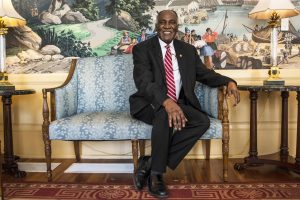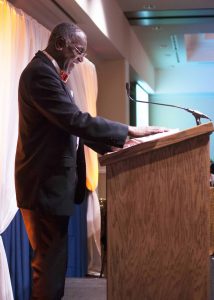Donald Cole was a student at the University of Mississippi six years after the university’s first black student, James Meredith, was admitted to the university — a time when black students had little to no rights on campus.
Cole, who retired last week from his positions as an Assistant Provost and mathematics professor, has seen and pushed for many sweeping reforms on campus to make it more inviting for minority students.

Assistant Provost and associate professor of mathematics Dr. Donald Cole retired from the University of Mississippi on January 15. Photo by Ariel Cobbert
“I love the university, and I have worked very diligently and very hard with the university to make it a better place for others,” Cole said. “I have made a lot of personal sacrifices for the university to make it a university of the 21st century.”
Cole sacrificed his college career when he and many other black students protested the treatment of black students in 1968. He marched on the chancellor’s lawn and presented him a list of demands.
The demands included hiring black faculty and staff members, recognizing the Black Student Union as an organization, integrating The Daily Mississippian staff and recruiting black athletes.
The protest resulted in Cole and seven other students being arrested and expelled from the university.
“(Being arrested) was horrible,” he said. “I came to the university to get a degree. There were a lot of people who had supported me. I come and in a little over a year, I had been dismissed. I couldn’t get in any other state institution. I was in jail for the first time in my life.”
Sparky Reardon, the former dean of students at the university, was the managing editor of The Daily Mississippian during the protests and said the students had drafted the list of demands two years earlier, but they sat dormant out of fear of retribution from campus leaders.
Reardon said the breaking point that led the students to protest was the assassination of the Rev. Martin Luther King Jr.
He said the reason that Cole and other students were expelled from campus was that the president of the state college board, M. M. Roberts, was a self-proclaimed racist.
“I have no apologies for (my views), though,” Roberts said in Reardon’s dissertation. “It’s me. … But it’s my philosophy. Many of you don’t share that philosophy, and it doesn’t bother me. … I don’t share yours.”
Reardon said he became good friends with Cole when both were administrators, and Cole was “a part of several committees” that caused change, such as the Creed Committee, which led to the creation of the university’s creed.

Assistant Provost and associate professor of mathematics Dr. Donald Cole retired from the University of Mississippi on January 15. Photo by Devna Bose
“I’ll always remember him as a firm voice of reason, change and decency,” Reardon said. “He could get you to change your mind without beating you over the head. He would kill you with kindness.”
Jacqueline Certion, the director of the university’s FASTrack program, said that Cole has been a mentor to her through the years. They worked together on the Bears and Books project, which was an annual event sponsored by black faculty members during which books, stuffed bears and toys are collected and donated to facilities management workers on campus.
She said the thing she admires most about Cole is his genuine heart and desire to serve others constantly.
“I’ve seen him interact with our support staff; I’ve seen him interact with our facilities management workers; I’ve seen him interact with the chancellor,” she said. “And he’s the same Dr. Cole with every single population, and that just speaks to how genuine he is.”
Certion jokingly said she would always remember him as a great mathematician, an outstanding jokester and someone who “walks really, really fast.”
“I truly believe his name needs to go on something,” Certion said. “It needs to be brick and mortar because I think brick and mortar means the longevity of who Dr. Donald Ray Cole is as a person is going to be seen throughout generations.”






